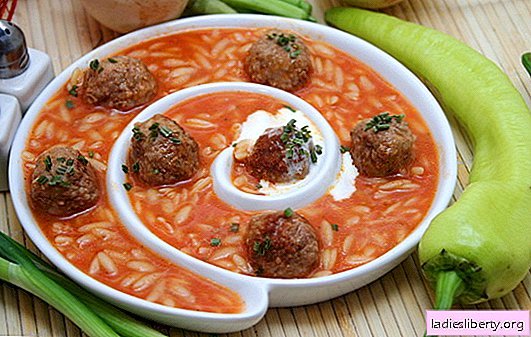
Inflammation of the small intestine has a medical name - enteritis. By itself, enteritis is a guest infrequent in the human body. In isolation, that is, without involving other organs of the gastrointestinal tract in the pathological process, inflammation of the small intestine practically never occurs. Cases when enteritis "in its pure form" was diagnosed in patients are casuistry. Where more often there is a complex lesion of several organs. The most commonly affected are the liver, large intestine, and stomach.
In addition, enteritis is not a single disease. The small intestine is formed by several departments, each of which has its own name. Accordingly, the inflammation of each of the departments has its own specifics, but more importantly, treatment in each case requires correction. Enteritis is terrible not only for its symptoms, which “tear” the patient for several days out of the usual rhythm, but also for complications.
In order not to save in the face of this unpleasant disease, you should know as much as possible about it.
Small intestine inflammation: causes
The causes of inflammation of the small intestine, in general, are typical of any disease of the gastrointestinal tract.
• Alimentary causes. In other words, diet features. Enteritis, for nutritional reasons, is more common among young people, office workers and other people who are unable to eat fully during the day. A risk group also includes those in whose diet fatty, smoked, fried foods predominate. In these cases, inflammation of the small intestine is caused by systemic malfunctions in the entire tract. According to statistics, errors in nutrition are the culprits of enteritis in 75-80% of cases.
• Helminthiasis. Helminthic infestations are a less common cause. The main "intruders" are lamblia, roundworms, etc.
• Infectious lesion. It can also be attributed to the group of nutritional causes, however, in this case, the source of the problem is different. Eating poor-quality or expired product, a person lets in a lot of uninvited guests into his body. Usually we are talking about salmonella and shigella. Other agents are much less common.
• Dysbacteriosis. Disorders of the microflora of the large intestine will inevitably lead to problems with the small intestine.
• Autoimmune diseases. Fortunately, they are rare and are characterized by increased complexity in treatment. Among autoimmune diseases, Crohn's disease comes to the fore. This pathology affects not only the small intestine: under attack, the entire digestive tract, from the oral cavity to the large intestine and anus. The direct source of this group of diseases is the malfunction of the body's defense system, when immunity mistakenly starts attacking healthy cells.
• Allergic reactions. In the vast majority of cases, enteritis due to allergies is found in children. But adults too early to exhale with endowment. It all depends on the characteristics of the body of a particular person.
• Genetic features. The specifics of the digestive system are inherited: if one, and even more so, both parents had enzymatic deficiency, the child will receive the same features and the same bouquet of probable problems. And that means predisposition to enteritis, colitis, etc.
• Heat intolerance. Some people suffer heat worse than others. Such patients develop "summer diarrhea." Behind such a comical name lies hyperactivity of the small intestine. As a result, a chain reaction occurs, and the failure affects the entire digestive tract.
These causes of inflammation of the small intestine are most common in the daily practice of a doctor. The intestines become inflamed somewhat less after injuries and surgical interventions.
Small bowel inflammation: symptoms
As mentioned above, the small intestine consists of several sections. However, oddly enough, the symptoms are almost always the same. In medical practice, there is a separation of enteritis into two types: acute and chronic. The whole difference between these types of inflammation of the small intestine is the intensity of the symptoms: in acute enteritis, the clinic is brighter.
A characteristic set of manifestations includes:
• Stomach ache. Localization of pain - the navel, epigastric region. By nature, uncomfortable sensations can be dull, bursting, aching. Dagger pains are much less common. Pain of clear localization occurs only with "pure" enteritis. If the pain spreads, change their position, most likely the process has captured neighboring areas of the gastrointestinal tract.
• rumbling.
• Discomfort. In addition to pain, the patient experiences a feeling of movement, transfusion in the abdomen.
• Diarrhea. With isolated inflammation of the small intestine, this symptom does not occur. Changes in stool with colitis are not noticeable at first glance: fat is found in the feces (feces become sticky, poorly washed off), mucus impurities. Diarrhea indicates damage to the colon, gall bladder, or pancreas. The frequency of urges can reach up to 15-20 times during the day. In the systemic process, tenesmus is possible - a false urge to defecate.
• Weakness, malaise.
• Rise in body temperature. The numbers can be different: from 37.5 to 39-40 degrees. This is a formidable manifestation that requires attention. Accordingly, along with hyperthermia, signs of general intoxication of the body appear: headache, dizziness, etc.
• Lack of appetite.
• Flatulence.
• bloating.
• Rashes (with allergic origin of enteritis).
• Nausea, vomiting, feeling of fullness in the epigastric region. This is direct evidence that the stomach is also affected.
The duration of such symptoms of inflammation of the small intestine is 7-10 days. Solving the problem on their own is not recommended: there is a high risk of mistakes or the start of incorrect treatment. Then enteritis will become chronic. In some cases, you can not do without calling an ambulance:
• If cramps are observed.
• If blood pressure drops.
• If your body temperature rises above 39 degrees.
To be afraid or hesitate to call an ambulance is not worth it.
Small Intestine Inflammation: Diagnosis
Diagnosis is not particularly difficult. First of all, the patient needs to see a gastroenterologist. The specialist will prescribe the necessary studies. In addition to those conducted at the initial consultation (oral interview of the patient about his complaints, palpation of the abdomen) the specialist resorts to the following methods.
• General blood test. Allows you to identify signs of inflammation (this is evidenced by a high level of ESR, white blood cells).
• Analysis of feces (coprogram). It is necessary to identify enzymatic deficiency, assess the usefulness of the digestive function of the intestine, infectious lesions.
• Blood biochemistry.
In most cases, these studies are enough to fully diagnose inflammation of the small intestine. If the doctor considers it necessary, other instrumental examinations are prescribed.
• FGDS. Minimally invasive examination of the stomach and duodenum (one of the departments of the small intestine) using a probe.
• Colonoscopy. Allows you to visually assess the condition of the colon.
• Capsule endoscopy. A modern, but inaccessible, expensive study that allows visual assessment of all parts of the small intestine. It consists in taking a special capsule, which fixes the state of the surrounding tissues on a miniature video camera.
Diagnosis of inflammation of the small intestine is relatively simple. But this does not mean that you do not need to go to the doctor: to diagnose to himself this occupation is useless and dangerous.
Small intestine inflammation: treatment
The basis for a successful treatment of inflammation of the small intestine is a competent diet in a system with correctly selected medicines.
The diet for enteritis should exclude all fatty, spicy, smoked, fried and excessively salty foods. Preference is given to fruits, vegetables, bread (black), low-fat poultry, low-fat sour-milk products. Thanks to such nutrition, it is possible to reduce the load on the affected intestine and reduce the duration of treatment and rehabilitation by at least 1.5. times.
Drug therapy has two goals: relieving symptoms and eliminating the root cause. For their implementation, the following drugs are prescribed:
• Antispasmodics. They are used to relieve spasm of intestinal muscles. It is the spasm that the patient is tormented by pain. The names are different: No-Shpa, Duspatalin, etc.
• Analgesics. They are prescribed when antispasmodics do not fully cope with the task assigned to them.
• Immunosuppressants. They are used in the treatment of autoimmune diseases.
• Anthelmintic drugs (Albendazole, etc.). Based on the name of the group of drugs, parasites are destroyed.
• Antibiotics.
• Anti-inflammatory drugs.
• Sorbents. "Absorb" toxins that poison the body and remove them from the body.
• Enzymes (Creon, Mezim, Pancreatin). They help the body make up for the lack of enzymatic substances and at the same time reduce the burden on the digestive tract.
• Carminative drugs (Espumisan, Almagel). Help get rid of excessive gas formation.
Enteritis in its pure form practically does not occur. Most often, inflammation of the small intestine means a systemic lesion of the entire gastrointestinal tract of an infectious, alimentary or other origin. Be that as it may, it is impossible to make a diagnosis on your own, much less to prescribe treatment. This is a waste of time and a game with your own health. It is much more reasonable to go for a consultation with a gastroenterologist. Treatment for small bowel inflammation should be started as soon as possible. So the patient will protect himself from the transition of the disease to the chronic stage and the development of complications.











